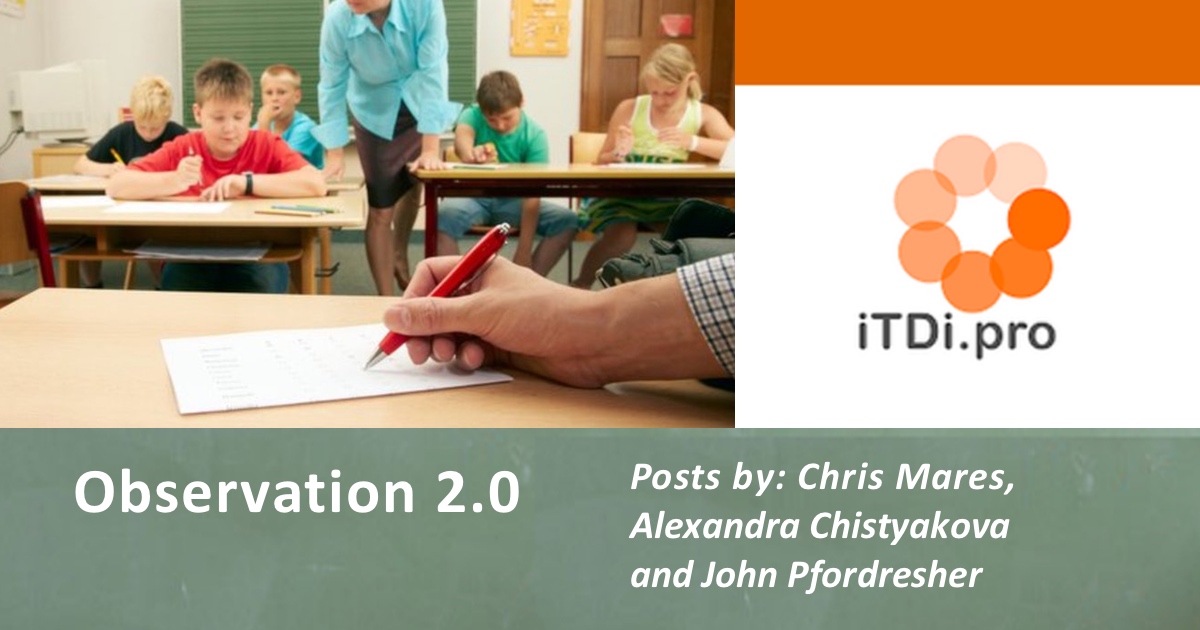
How important is peer observation for teachers?
In my case, the peer observation I went through early in my teaching career became a turning point in my professional development. In fact, most of what I know about and can do in the classroom in terms of teaching a foreign language I owe to peer observation. It’s through observing a highly professional teacher that I learnt how to teach.
However, the way I did my peer observation was somewhat non-standard: I wasn’t just sitting at the back of the class observing another teacher and her class. I was exceptionally lucky to be both the observer and the recipient of teaching – I was a peer observer disguised as a regular student. No, that wasn’t my plan to fool my teacher in order to spy on her in secret, that would have been the meanest thing to do. As a matter of fact, I was a student in the English Conversation and Pronunciation course at Oxford House College in London. I went there simply to improve my English skills and in no way could I imagine I would be improving my teaching skills as well.
By that time I had already been teaching English for two years. But as I hadn’t been trained to be a teacher, all I was doing in my classroom was to diligently copy my own university teachers. I should admit here that in many respects it was some kind of grammar-translation method with bits of communicative approach. Actually, I didn’t even think that it was possible to teach languages in any other way since it was the only way I had experienced and observed (talk about the importance of observation!) as a language learner.
Now you can imagine my utter surprise when after the first week of my English course in Oxford House College I realized that without any homework and drills I could effortlessly use the vocabulary and expressions we studied in class. It felt like pure magic! I decided to meticulously record everything my teacher did in class in order to unravel the magic. That was the start of my two-month peer observation and the beginning of my transformation as a teacher: I would carefully write down what activities we were doing and in what order, I would number the corresponding worksheets and handouts, I would note down some bits of instructions and my own comments to the activities. By the end of the course, I had a detailed outline of each and every lesson we had. Thus, I could look back at my notes to analyze and reflect on the classroom procedures and teaching techniques and to learn from them.
When I came back to my classroom at the start of a new academic year, I felt motivated to teach like I had never done before because now I knew how the magic worked and I knew how to work this magic! I had a much clearer understanding of what should be done in the classroom and why this should be done.
All in all, it seems to me there are two types of peer observation: when you observe what is happening in the classroom without taking part in the classroom activities, and when you actively participate in the process and evaluate the learning and teaching processes from the inside. I believe both ways are worth trying. The first type allows you to see the broader picture and also notice some subtle developments that you may overlook while being engaged in the process. However, doing the classroom activities yourself can give you an invaluable opportunity to look at things from a learner’s perspective. Moreover, the second way of observing your peers largely prevents you from being too judgmental and jumping to conclusions too quickly. It’s necessary to note here that the latter two tendencies (being judgmental and jumping to conclusions) should be avoided as much as possible because they are the biggest obstacles to effective peer observation as they make you biased in what you see in class.
So, how important is peer observation for teachers? From my perspective, it’s highly important because non-judgmentally observing others may help you find out new teaching techniques, may make you reconsider your own practices, and undoubtedly will help you develop professionally and extend your arsenal of teaching tools and tricks. In addition to this, peer observation may lead to a constructive dialogue between teachers and has the potential to help teachers build a collaborative and supportive community.
This was my story of peer observation. What’s yours?


